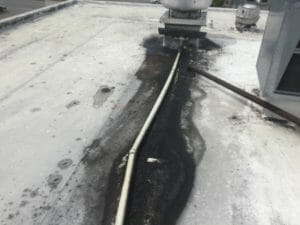MORE ARTICLES YOU MAY ENJOY
Service and Repairs
When Disaster Strikes: How Maxwell Roofing Helped a Business Recover After a Tornado
No property manager or building owner ever wants to deal with a roofing emergency. But…
Systems & Materials
Roof Recovery vs. Replacement: How to Choose the Best Solution for Your Commercial Roof
Maintaining a commercial roof requires careful consideration, especially when it starts showing signs of wear.…
Preventative Maintenance
Preventative Commercial Roof Maintenance: Everything You Need to Know
When it comes to protecting your commercial building, your roof is one of your most…
Preventative Maintenance
The Ultimate Guide to Commercial Roof Leak Detection and Prevention
A leaking roof is every commercial building owner or property manager’s worst nightmare. Even small…

